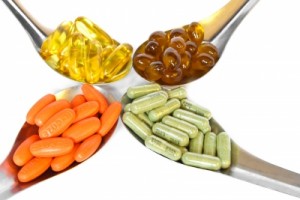Some important things to know about vitamin B12 and potassium involve absorption of vitamin B12. People with either vitamin B12 deficiency (pernicious anemia) or potassium deficiency (hypokalemia) must understand about this crucial link between vitamin B12 and potassium supplements, in order to prevent severe ailments.
Vitamin B12 and potassium
Patients of potassium deficiency who take potassium chloride for an extended period run the risk for developing vitamin B12 depletion, as potassium supplements interfere with your ability to absorb vitamin B12 and dispense it into your bloodstream. For this reason, doctors don’t recommend taking vitamin B12 and potassium together for a long period.
Your body has a limited amount of vitamin B12, which is stored in the liver. Healthy people constantly add to this supply of vitamin B12 whenever they eat meat or fish. But if you have potassium deficiency, and go on a long-term regimen of potassium supplements, then the vitamin B12 cycle is interrupted, and your body is forced to draw vitamin B12 from the liver.
Over time, as vitamin B12 malabsorption continues, you develop vitamin B12 deficiency symptoms that could, eventually, cause irreversible neurological damage and ailments like fatigue, memory loss, muscular pain, and mobility disorders.
Vitamin B12 malabsorption
Vitamin B12 deficiency is one of the most common types of malnourishment, and it strikes people of all ages. In most cases, it is caused by vitamin B12 malabsorption, or the inability to digest vitamin B12 in the stomach. Causes of vitamin B12 depletion, in such cases, may include lifestyle changes, comorbid illnesses, or medications, like potassium, and vitamin B12 levels drop severely.
Absorbing Vitamin B12, a Metabolic Gastrointestinal Journey
Vitamin B12 deficiency
Your body needs vitamin B12 for many important biological functions; your body relies on adequate amounts of vitamin B12 (cobalamin) for producing healthy red blood cells, converting carbohydrates into energy, protecting the nervous system, and maintaining cognitive skills.
Vitamin B12 occurs naturally in all animal-based foods, such as meat, poultry, seafood, eggs, and dairy products. Foods highest in vitamin B12 include organ meats, shellfish, halibut, and chicken. If you follow a strict vegan diet, then you are susceptible for vitamin B12 deficiency, unless you take weekly vitamin B12 supplementation.
Still, many non-vegans are at risk for vitamin B12 deficiency, as certain factors may inhibit your ability to absorb vitamin B12 from the foods you eat. This is where the vitamin B12 and potassium connection lies.
Please tell us…
Do you have any questions or suggestions? Please leave your comments below.
Share with your friends!
If you found this article helpful, then please share with your friends, family, and coworkers by email, Facebook, or Google+.
Like this? Read more:
Am I Getting Enough Vitamin B12?
Vitamin B12: the Energy Elixir
References:
Potassium Supplementation and B-12 Deficiency
Images courtesy of FreeDigitalPhotos.net


